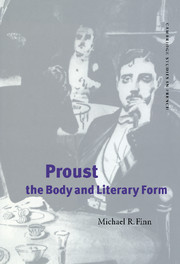Introduction
Published online by Cambridge University Press: 05 November 2009
Summary
Over time, I have come to believe that neurasthenia – that fin-de-siècle chronic fatigue syndrome – and, to a lesser extent, hysteria, are not simply surface features of the lives of certain characters in A la recherche du temps perdu, but figures that, in important ways, condition the Proustian notion of style, and organize and structure both the aesthetic debate in the novel and the life messages it conveys. It would be silly to want to reduce Proust's great work to an early twentieth-century case-study in the naturalist vein; but the novel should be read, at least on one level, as a fin-de-siècle moral tale in which art and aesthetics conquer medical determinism. It is, after all, the story of a ‘nervous Narrator’ who struggles against negative hereditary factors in his family (personified in the semi-invalid aunt Léonie), and who suffers from a chronic lack of drive that makes him prefer salon time to productive time alone. If Proust's protagonist belongs to a long line of what Roy Porter has called articulate sufferers, and if it is arguable that A la recherche is a narrative of disease, it is in part because there is a medico-psychological context to the novel, with familial, societal and literary components, that requires further exploration than it has received to date. We should not forget, for instance, that one of Proust's earliest titles for his work, ‘Les Intermittences du cœr’, had medical overtones as well as the emotional ones that are at first most evident.
- Type
- Chapter
- Information
- Proust, the Body and Literary Form , pp. 1 - 9Publisher: Cambridge University PressPrint publication year: 1999

